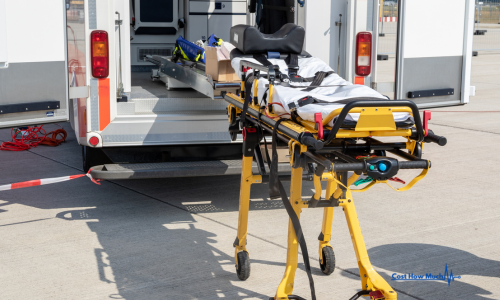Always confirm costs with your healthcare facility and/or insurance coverage
Whether you’re outfitting a medical facility, buying for emergency preparedness, or managing an event response team, you might be wondering: how much does a stretcher actually cost? Spoiler: there’s no one-size-fits-all answer.
Stretcher prices range from a few hundred bucks to tens of thousands depending on features, use case, and brand. Let’s break it all down.
Average Cost of a Stretcher by Type
Stretcher Type |
Typical Price Range |
Best For |
|---|---|---|
Basic Folding Stretcher |
$100 – $400 |
Emergency kits, basic first aid |
Manual Wheeled Stretcher |
$500 – $2,500 |
Clinics, non-emergency transport |
Hydraulic/Electric Ambulance Stretcher |
$2,500 – $10,000+ |
EMS, hospitals, ambulances |
Scoop Stretcher |
$300 – $800 |
Sports injuries, spinal precautions |
Basket (Rescue) Stretcher |
$700 – $2,000 |
Mountain rescue, water rescue |
Mortuary / Transfer Stretchers |
$600 – $2,500 |
Hospitals, funeral services |
🚫 Prices can vary dramatically depending on brand, build quality, and weight capacity.
What Affects the Price of a Stretcher? 💳
✅ Materials Used
- Aluminum stretchers are lightweight and affordable.
- Stainless steel or carbon fiber = stronger, longer-lasting, and more expensive.
✅ Mobility Features
- Powered elevation, all-terrain wheels, hydraulic lifts, and adjustable frames drive the price up.
✅ Weight Capacity
- Standard: up to 400 lbs
- Bariatric: 600–1,200+ lbs (can cost 2–3x more)
✅ Brand Reputation
- Ferno, Stryker, and Hill-Rom command higher prices due to build quality and warranty support.
Where to Buy a Stretcher 🛒
Source |
Pros |
Price Notes |
|---|---|---|
Medical Supply Stores (Online) |
Wide selection, new equipment |
Mid-to-high prices |
Used Equipment Marketplaces |
Cheaper, good for training or backup use |
$300 – $3,000 |
Direct from Manufacturer (e.g. Stryker, Ferno) |
Latest models, warranties |
Highest cost |
Amazon / eBay |
Budget models, quick delivery |
Varies; check reviews |
🚀 Pro Tip: Always verify weight limits, folding capability, and certifications if buying used.
Do You Need a Medical License to Buy One? ❓
In most cases, no license is required to buy a stretcher—especially if it’s for personal or organizational use, not patient transport in an ambulance.
However, if you’re outfitting a professional EMS vehicle, you’ll need to follow state/local regulations and certification standards for equipment.
How to Save Money on a Stretcher 🎁
✅ Buy Used or Refurbished
- Hospital liquidation sales and surplus dealers offer stretchers at 30–70% off retail.
✅ Skip the Overbuilt Models
- Only buy advanced features if you truly need them.
✅ Look for Package Deals
- Some retailers offer bundled pricing for accessories like straps, IV poles, or head blocks.
✅ Negotiate Shipping Costs
- Stretchers are bulky and heavy—shipping can add hundreds. Always ask.
Accessories That Add Cost 🦜
Accessory |
Typical Add-On Cost |
|---|---|
Patient Restraint Straps |
$30 – $150 |
IV Poles / Oxygen Mounts |
$50 – $300 |
Head Immobilizers |
$40 – $200 |
Stretcher Covers / Sheets |
$20 – $100 |
📄 Many premium stretchers include some of these by default—double check before you buy separately.
Final Thoughts 😎
A stretcher can cost as little as $100 or as much as $10,000+, depending on what you need it for. Basic folding models are budget-friendly and great for personal use or light duty. But if you’re buying for EMS or professional transport, expect to spend serious money.
Shopping for one? Drop your use case or brand preference in the comments—we’ll help you find the best bang for your backboard. 💬




🧾 User-Reported Cost: So, if you’re thinking about dropping a fortune on a stretcher, just remember. you can’t use your couch for transport! And who knew cup holders were a must-have for hospitals?
🧾 User-Reported Cost: Oh man, you hit the nail on the head! Stretcher prices can range anywhere from a few hundred bucks to several thousand dollars, depending on the features and brand you choose! And seriously, cup holders? That’s like the cherry on top for making those hospital trips just a bit more convenient! I guess convenience comes at a price!